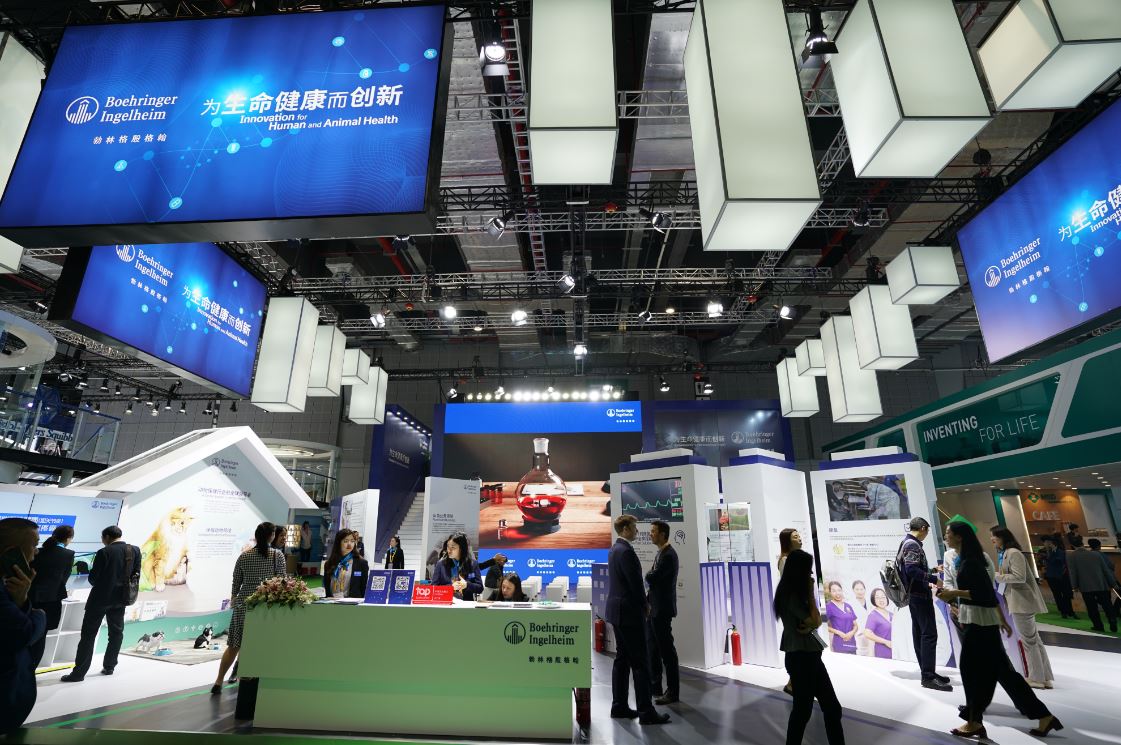Global companies step up investment in China
Foreign businesses are stepping up their investment and forming more local partnerships to reinforce their strong commitment to China and cash in on the country's vast market potential and dynamic growth momentum, experts said.
Foreign businesses are stepping up their investment and forming more local partnerships to reinforce their strong commitment to China and cash in on the country's vast market potential and dynamic growth momentum, experts said.

The stand of Boehringer Ingelheim during an import expo in Shanghai. [Photo/For China Daily]
Dassault Systemes, a French industrial software company that creates 3D models for multiple industries, said it has been strengthening its "In China, for China, with China" strategy since the COVID-19 epidemic, especially as the Chinese economy has shown strong resilience.
The company, which relocated its Asia-Pacific headquarters to Shanghai, is looking to triple the number of employees in China to around 2,000 over the next five to 10 years, according to Sylvain Laurent, executive vice-president of Dassault.
"We are now definitely in an acceleration phase, as the demand from customers across China is huge,"Laurent said. He noted that the dynamism from local partners such as the Commercial Aircraft Corp of China and Shanghai Jiangnan Shipyard is fueling their capacity and pace for growth.
"Shanghai has recognized the value of Dassault and the role of technology as a key enabler for growth. They also recognize our capacity and our (role as) a catalyst to attract new companies for the future," he said.
The Rockefeller Art Foundation of the United States announced recently that it would set up its China headquarters in Shanghai, just a year after the organization's debut in the country. A grand investment of $2 billion over the next four to five years is also in the pipeline. The investment amount does not include the industry-related investments upon project completion, said Hui Xin, China CEO of The Rockefeller Art Foundation.
"The pandemic or the current turbulence in Sino-US ties has not shaken our resolve to (invest here)," said Hui. "We are still firmly committed to having our roots in China and serving Shanghai. As China's economic development reaches a certain stage, people will naturally seek high-quality art and cultural works, and that's where we perceive our opportunities are," he said, adding that foreign businesses also need talent from China for promoting a "benign mutual cycle" for information flows.
Hui's remarks come on the heels of 54 foreign-invested projects being inked in Shanghai on Wednesday, suggesting a fresh vote of confidence in China even as the global economy has taken on a grim look.
Boehringer Ingelheim is investing 450 million euros ($519 million) in China over the next five years, a move that the pharmaceutical giant considers is "a good moment", said its China chairman and CEO Felix Gutsche.
"We will continue to invest in China and for China ... It's a good moment to reconfirm our presence in China, and in Shanghai," he said.
The company is also driving innovation in a "in China for China" manner, and believes that "domestic industries in combination with international industries" are the right way of doing it.
Appen, an artificial intelligence company headquartered in Sydney, Australia, is doubling down on its $200 million investment in Shanghai largely on the growing prospects of AI development in the country, according to senior vice-president and China general manager Tian Xiaopeng.
"The best things about investing in Shanghai are that we are able to collect, train and speed up training of the data to ensure the accuracy, reliability and safety of data and better adoption of AI in China," said Tian.

